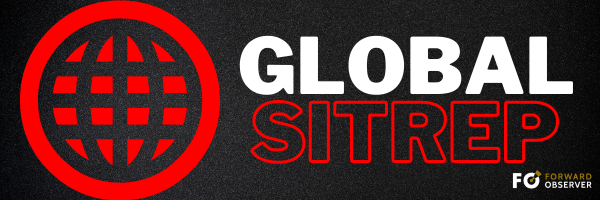Good morning, and welcome to the Global Situation Report for Tuesday, 09 January 2024.
- US TREATMENT OF SPIES WILL UNDERMINE ALLIES’ CONFIDENCE: The Department of Justice announced that they convicted United States Navy Petty Officer Wenheng Zhao of espionage for Chinese intelligence.
- Over the course of 21 months, he transmitted maritime exercise programs, operational orders, electrical diagrams, and blueprints for radar systems stationed in Okinawa. Zhao faced up to 20 years in prison for espionage.
- The DOJ sentenced him to 27 months in prison and fined him $5,500.
- Petty Officer Jinchao Wei, another spy arrested over the summer, has yet to be convicted.
Why It Matters: Zhao, 26, will leave prison before he turns 30. As the U.S. prepares for a possible conventional war with China, it does very little to actually discipline spies from this same foe. China is unlikely to press this issue, but our allies will certainly see it and are right to question if the United States can be counted as an effective participant in any future war against China. – J.V.
- JAPAN PREPARES EVACUATION OF TAIWAN: Japanese Deputy Prime Minister Taro Aso announced Japan needs a plan to evacuate its diaspora in Taiwan in the event of a conflict.
- Aso suggested using submarines and “other means” in the Taiwan Strait while pointing out that this could not be done during peacetime.
- Chief Cabinet Secretary Matsuno Hirokazu met with Taiwanese officials last October to discuss evacuating Okinawan residents after the Japanese Self-Defense Force practiced evacuating 120,000 residents.
Why It Matters: Japan’s actions suggest an imminence to the problem. This is likely a response to the Taiwanese election on Friday, as the secessionist candidate was ahead in the latest polls. If Japan opted to stay out of the conflict but still sent warships and submarines into the Taiwan Strait, they would likely be immediately sucked into the conflict, as China would view these as hostile actions. Those events would let Japan claim to be a defendant, which activates the mutual defense treaty with the U.S. – J.V.
- OIL TANKERS CONTINUE RED SEA ROUTES: Oil and fuel tanker traffic in the Red Sea was stable in December despite the increasing Houthi attacks on container ships, according to a report by Reuters.
- On average, 76 tankers carrying oil and fuel were in the south Red Sea and the Gulf of Aden daily in December – just below November’s daily average of 78 and three ships less than the daily average for January through November 2023, according to data from ship tracking service MariTrace.
- “Shippers and their customers really want to avoid a scheduled disruption. So, they are still taking the risk,” said a maritime data provider.
- Many oil tankers transiting the Red Sea are carrying Russian crude oil to India, and the Houthis are not attacking these ships, Reuters noted.
Why It Matters: Houthi maritime attacks in the Red Sea are targeted. Tankers chartered by Indian refiners and other countries have navigated the area without incident. However, British Petroleum and Norway’s state-owned oil company Equinor have determined that the risks are too great, and these companies have paused all Red Sea transits. The Houthis and their Iranian allies’ control of this important maritime choke point could drive another round of global goods inflation, and they are asserting that America’s unipolar dominance moment is over. – H.B.
The Houthis are particularly targeting cargo ships heading to or from Israel. Within the last week, the Houthi leadership announced they’d be targeting ships associated with Operation Prosperity Guardian nations regardless of destination. While the Houthis have not targeted India, Houthi actions are creating an environment favorable to piracy, which has recently targeted Indian commercial vessels. – J.V.
THAT’S A WRAP: This does it for today’s edition. Thank you for reading. If you know folks who would also like to receive this email, would you please forward it to them? We appreciate you spreading the word. – M.S.


This comment will be a lot more localized to Texas. We are looking at another extreme cold weather event. Winter storm URI in Feb 21 ERCOT had to physically disconnect approximately 40% of Texas electricity users due to power plants coming offline. ERCOT has grown about 5% in users without adding reliable power generation. This continued growth will continue to be a problem during extreme cold weather events. This cold weather event differs from URI because it appears at this point in time there will not be any icing. If icing becomes part of the event it will cause more damage and increase chances of electrical blackouts. Complete blackout for Texas will be extremely catastrophic for the residents to endure. The time to restore cannot be accurately estimated. Days at a minimum and 2-3 weeks at worst.